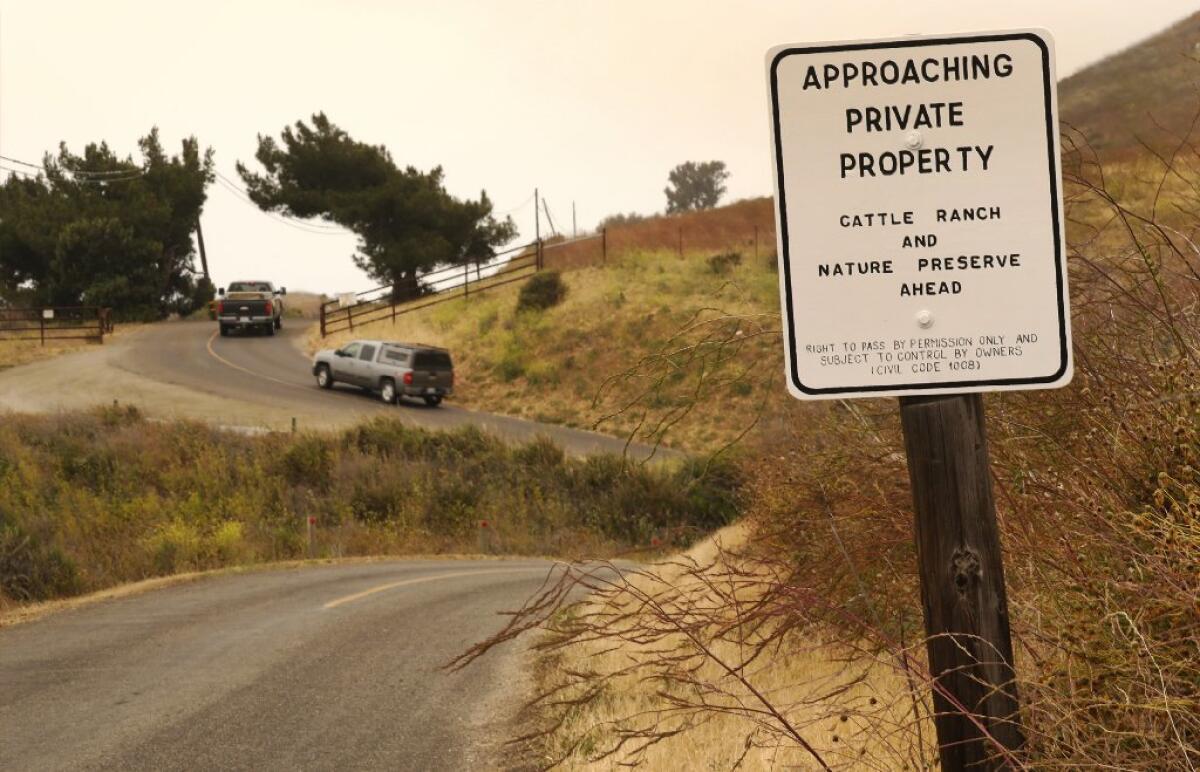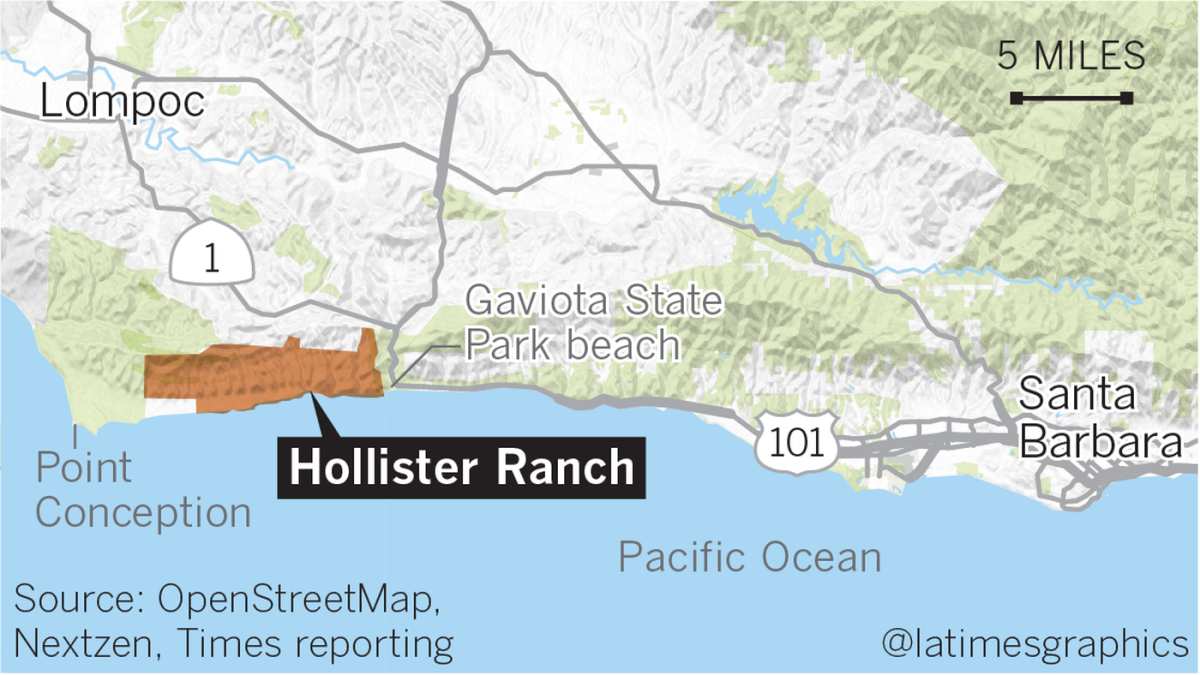Coastal advocates challenge deal that bars public from reaching Hollister Ranch by land

Outraged by a deal between wealthy landowners and state officials that bars the public from accessing Hollister Ranch by land, a coalition of activists on Monday took a final shot at opening a secluded stretch of the California coast.
The legal challenge is the public’s only way to intervene in an agreement reached quietly by the state Coastal Commission, the California Coastal Conservancy and the Hollister Ranch Owners Assn. granting access to a section of untarnished shoreline in Santa Barbara County only to select guided tours or those who can boat or paddle in.
Coastal officials in return agreed to give up their claim of any public route by land, capping a bruising legal battle with powerful landowners, who for decades have fought to keep Hollister Ranch’s 8.5 miles of coastline almost entirely to themselves.
This deal is unfair to the beach-going public, said the Gaviota Coast Conservancy, California Coastal Protection Network, Coastwalk/California Coastal Trail Assn. and the Santa Barbara County Trails Council in a motion to Santa Barbara County Superior Court.
“This proposed settlement was conceived and executed behind closed doors, and offers no benefit to public coastal access,” said Marc Chytilo, an attorney representing the groups. “It has become necessary for community groups to step into the breach and prevent this one-sided relinquishment of public rights and misuse of funds.”
The deal received preliminary approval in May. But in an unusual legal twist, Judge Colleen Sterne said she was concerned that the public was not provided sufficient knowledge of the settlement and invited Californians to formally intervene as a third party to the case.
The response has been immense. More than 1,500 people emailed the Coastal Commission lambasting the deal. Attempts of reaching the beach by kayak have proven treacherous even for the most able-bodied and experienced.
The public seemed intentionally left out of the negotiations, advocates said, pointing to a court brief by the state attorney general’s office arguing that offering the public this opportunity to intervene was unnecessary and “would undermine the power of public agencies to settle cases and unnecessarily delay litigation.”
“Nothing requires that the public be given notice of the carefully crafted settlement the parties have achieved in this case, let alone an opportunity to comment on the settlement,” the brief said. “The Conservancy and Commission fully represent the interests of the public in this matter.”
The optics, critics said, are damaging — particularly at a time when high-powered interests across the state are fighting to keep beaches to themselves. At Martins Beach, a Silicon Valley billionaire is trying to challenge the very constitutionality of the state’s Coastal Act before the U.S. Supreme Court.
Some commissioners, who had voted in closed session last year, said they were also taken aback by the terms of the deal.
“There are a lot of things that have been pointed out by the public that make me feel uneasy about the settlement,” Commissioner Mark Vargas said, addressing those who spoke out during a meeting in Santa Cruz earlier this month. “I was not privy to some of these final notes from the settlement agreement until recently, and they make me very uncomfortable, they make me very nervous. I sympathize and appreciate the public’s input on this.”
Attorneys for the Hollister Ranch Owners Assn. said they will review the filings.

The clash over property rights and public access at Hollister Ranch began about 40 years ago when a group of landowners sued the Coastal Commission for requiring public access-ways when applying for development permits. State lawmakers allowed them to pay a $5,000 fee in lieu of an access way. This money, amounting to $295,000 today, was set aside to fund a state access plan that remains in limbo.
With Hollister Ranch essentially exempted from the typical access rules for beachside properties, the last chance the state had for public access by land was a rugged road that the YMCA offered to open to the public in 1982 as it sought permission to build a recreational center.
Coastal officials are now agreeing to give up any claim to this path. The route involves walking through a drainage tunnel that opens into a steep and sudden drop, depending on the amount of sand. Making this trail safe for the general public, they said, would be nearly impossible.
With such limited options, they said, the deal at least provides the first opening of any public access at Hollister Ranch. Officials are looking into boat rides to the beach and other ways to expand public access by ocean.
Landowners, as part of the settlement, agreed to expand the Hollister Ranch Managed Access Program. This includes inviting disabled veterans and other underserved groups on guided trips, and providing at least 24 opportunities a year for K-12 groups of at least 20 students to learn about tide pools and marine ecosystems.
These programs will be funded by the in-lieu fees, according to the settlement. Critics say this is an insult to the original public access plan and further hampers the state’s ability to fight for more access in the future.
Read more about the Hollister Ranch settlement deal »
Coastal Commission Executive Director Jack Ainsworth said the settlement, though not ideal, shows just how hard it has been to win access at Hollister Ranch.
“The comments received, the public angst has provided an opportunity to shine a bright light on the historic lack of public access at Hollister Ranch,” he told commissioners. “I believe the answer to opening up wider public access to the ranch will take a legislative change.”
The ranch has infamously kept the public at bay with a guard shack, gates and security patrols. Landowners have contended that letting the public in could spoil the ranch’s coastline and undo years of effort to protect the environment.
Rich Everett, an organic farmer from Santa Cruz who recently bought property on Hollister Ranch, said unfettered use of the ranch’s roads presents many safety concerns. Cattle roam on private roads free of fencing, he said, and cars have been known to go into the ranch’s many steep canyons — with no fire and rescue within a reasonable distance.
“The state doesn’t have the resources to properly keep the public safe… The state doesn’t have the resources to take on more land,” he said. “Have them focus on taking care of the coastline that they do have that’s open, and see how they do with that.”

In the more than 1,500 emails to the commission, Californians pushed back and said the deal “is not in the best interest of California and its citizens,” especially those who don’t have the means to live right on the coast.
“If we deny land access, it becomes a private beach,” said Kathleen Hamilton, who drove for seven hours from Riverside to address the commission in Santa Cruz. “The California beaches belong to all. And your job is to keep it that way.”
There are other options, advocates said. Some suggested a trail that begins at nearby Gaviota State Park beach, where there’s plenty of parking. A 2-mile hike would be a lot easier, they said, than a 2-mile paddle along a dangerous stretch of coast. Hikers could also reserve times to prevent overcrowding, as is the practice at some public parks.
“One of the principle purposes of the Coastal Act is to maximize the public’s access to and along the beach and to achieve recreational opportunities for ‘all the people,’” the coalition stated in its motion to intervene. “The public has the right to object to terms of the settlement on the grounds that it does not represent a fair settlement and is not in the public interest.”
The judge has agreed to reconvene Sept. 10 for a final hearing on whether to approve the settlement.
Interested in coastal issues? Follow @RosannaXia on Twitter.
More to Read
Sign up for Essential California
The most important California stories and recommendations in your inbox every morning.
You may occasionally receive promotional content from the Los Angeles Times.











